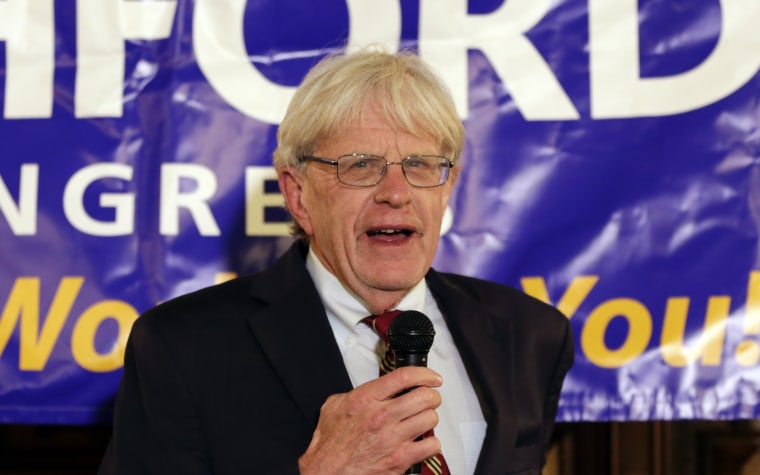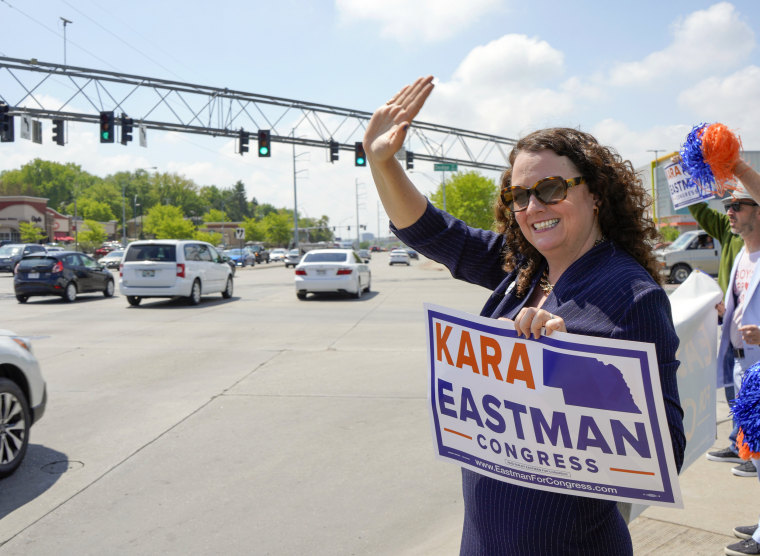WASHINGTON — Kara Eastman is the new darling of the left after defeating the party favorite in a stunning upset in a Democratic congressional primary in Nebraska on Tuesday.
Eastman distinguished herself by supporting single-payer health care, and her surprise victory means the most important issue in progressive politics will get a real electoral test in November.
She beat former congressman Brad Ashford, a moderate who was publicly favored by the Democratic Congressional Campaign Committee and party leaders.
Eastman has never run for political office before, but is known for starting the Omaha Healthy Kids Alliance, a nonprofit that works to make homes safer for children.
She campaigned on raising the minimum wage, eliminating tuition at state universities for families that make less than $125,000 a year, and moving toward public financing for elections.
In her TV ads, she declared she was "tired of hearing that Democrats don't have a backbone."
Washington Democrats worry Eastman's policy stances will jeopardize the party's chances of flipping the Oamaha-area seat, which leans slightly Republican.
Ashford is a Blue Dog Democrat who backs some restrictions on abortion — Eastman strongly supports abortion rights — and who won the seat in 2014, despite that year's Republican headwind. Party officials thought he was the best candidate to win it back this year (he lost it in 2016).
But in a year when Democrats seem eager to elevate women and fresh faces, Ashford fell in what some view as Democrats' first tea party moment.
The outcome caught national operatives off guard. While they say it's too soon to tell how the result will affect their plans, it seems likely the district will tumble down their priority list, if it doesn't get removed entirely.
At the same time, progressives are anxious for the chance to prosecute their case that Democrats don't have to run as centrists to win, even in places like Nebraska, especially in a potentially wave election year.
"Progressives want to prove this cycle that an inspiring economic agenda is how to win in red and purple districts, in addition to blue districts," said Adam Green, the co-founder of the Progressive Change Campaign Committee, one of Eastman's biggest supporters.
"We're eager to prove that views like Medicare for All, higher wages for workers, and other economic populist ideas are the right way to win," Green added.
Eastman's nomination means the general election, against Rep. Don Bacon, R-Neb., who ousted Ashford, is likely to be fought over Medicare for All, also known as single-payer health care.
"Kara Eastman showed the DCCC that far-left progressives are in full control of the party and they are just along for the ride," said Jesse Hunt, a spokesperson for the National Republican Congressional Committee. "Single-payer health care is Eastman's most passionate issue and her values are a better fit for Nancy Pelosi's San Francisco than Nebraska."
While Medicare for All encompasses a wide range of ideas, Eastman has signed on to the more maximalist approach, a House bill that would cover all Americans with a more generous version of Medicare.
Moving towards a Canadian-style health care system has been a pipe dream of the left for decades, but Democrats only began to take it seriously after President Donald Trump's election.
That means the politics of the issue remain largely untested, even as it has seen a meteoric rise in acceptance among mainline Democrats.
Nebraska's 2nd Congressional District, which Barack Obama narrowly won in 2008 and Hillary Clinton narrowly lost in 2016, now offers that test. And Omaha, the district's biggest city, is demographically fairly representative of the rest of the country.

This was not a fight so-called establishment Democrats wanted, however.
Supporters of Medicare for All are quick to point to polls suggesting the plan is popular, and say the party needs big ideas to get people to the polls. But more skeptical Democrats note the country has yet to seriously debate the issue.
That means Republicans haven't yet spent millions of dollars highlighting the costs of government-run health care, which could run into the trillions.
The president of House Majority PAC, Democrats' flagship congressional super PAC, argued on Twitter that while Medicare for All sounds nice, voters' opinions are likely to turn on a dime when they hear more.
But the one thing everyone agrees on is that no one really knows for sure, because the issue has never really been litigated in a competitive election.
Now, whatever Omahans make of Medicare for All may have lasting reverberations for the future of the Democratic Party and, by extension, the future of health care in America.
CORRECTION (May 17, 2018: 10:46, ET): A previous version of this article misstated the affiliation of Jesse Hunt. He is a spokesman for the National Republican Congressional Committee, not the National Congressional Campaign Committee.
